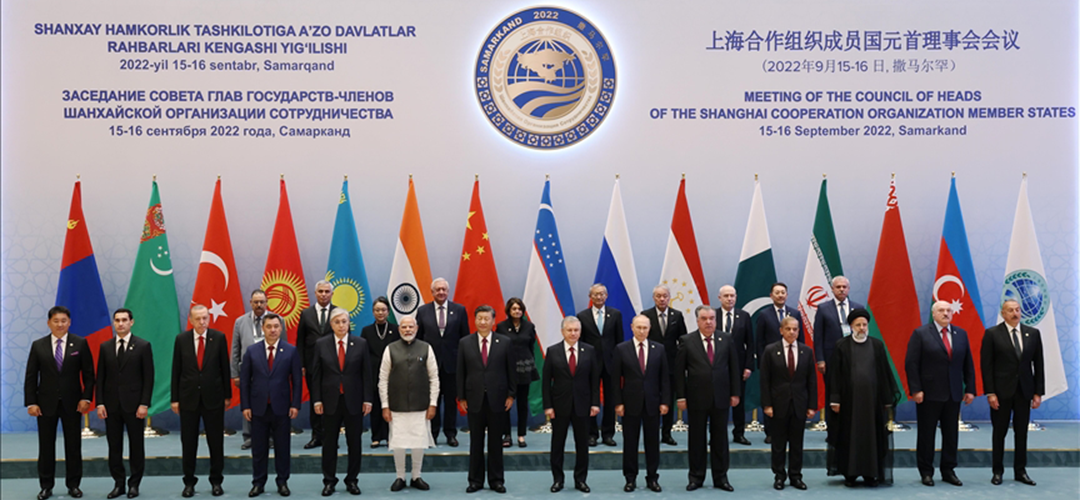ALL EYES ON SAMARKAND
September 17, 2022 | Expert Insights

Samarkand, located at the crossroad of global cultures on the ancient Silk Road, hosted the Shanghai Cooperation Organisation (SCO) summit early this week.
Media interest was focused on the summit because there were speculations that President Xi Jinping and Prime Minister Modi may be meeting on the sidelines after the recent positive developments on their mutual Himalayan borders. It was also the first time Mr Modi and his Pakistani counterpart Mr Shehbaz Sharif would be on a common platform.
Background
Headquartered in Beijing, the SCO (Eight members-China, Russia, India, Pakistan, Kazakhstan, Kyrgyzstan, Uzbekistan and Tajikistan with four observers including Iran and six dialogue partners including Turkey), has the potential to become a major bloc considering that its three top members alone account for an almost 25 percent of the GDP. The Turkish President and the newly elected Iranian President Ebrahim Raisi were also in attendance.
Sadly, geopolitical tension between the members (India-Pakistan, India-China, Uzbekistan-Tajikistan) results in the organisation performing far below its potential. This was underscored by the fact that even as the leaders landed in Samarkand, the host and its neighbour Tajikistan were involved in a border clash with over 30 fatalities. The SCO became a platform for both disputing nations to strike a cease-fire which has been repeatedly violated.
Analysis
It was the first time Presidents Putin and Xi Jinping met face to face after the launch of the ‘special military operation’ in Ukraine. In fact, it was President Xi’s first foreign trip after the pandemic.
Moscow and Beijing are under attack from the West- the former for its Ukrainian adventure and the latter for Taiwan.
Facing a resurgent Ukrainian army well reinforced with the latest NATO weaponry, the Russian President made an effort to bring together an anti-West front by calling upon the members and especially China and India, not to allow an unequal world order to run things. He asked the 'new centres of power to cooperate’.
In this, he supported President Xi Jinping, who also called for a new “international order in a more just and rational direction” to challenge western influence and give up “zero-sum games and bloc politics.”
The Russian President had a bilateral discussion with President Tayyip Erdogan to further cement their growing relationship. Despite being a NATO member, Turkey has played a pivotal role in mediating between Russia and Ukraine and was instrumental in releasing Ukrainian grain for UN food programmes in the recent past. President Erdogan also called for an end to the Ukrainian war through diplomacy. It was reported that Russia had offered a significant increase in imports from Turkey, a country under severe economic stress.
To alleviate the impact on food security, President Putin offered to release over 300,000 tons of fertilizer to the developing world for free. Unfortunately, this fertilizer is stuck in European ports due to sanctions.
Washington was closely watching the proceedings in Samarkand because their greatest concern was a Russia-China axis with military undertones. Mr Xi said that China was willing to work with Russia as two ‘responsible major powers', and in turn, Mr Putin was vocal in his support for 'One China' and was critical of U.S. provocations in the Taiwan Straits. A closer strategic partnership between Moscow and Beijing would not be in India's interest.
For India, it was an opportunity to emphasise trade as the member countries and observer/ dialogue partners constitute nearly 60 per cent of the global trade. Mr Modi called for closer trade and the creation of resilient regional supply chains. A jarring note was struck when, reportedly, the Prime Minister disagreed with the Russian President on the ongoing war in Eastern Europe, commenting that “today’s time was not a time for war.” However, officially there is no change in Indian neutral position on the Ukraine issue and Indian trade with Russia has continued as usual.
Assessment
- Despite being shunned by the West and many of their allies in Asia-Pacific, the SCO Summit was an ideal platform for President Putin to showcase his acceptability to many important nations of the globe.
- Next month Mr Xi faces the Communist Party Congress, where he may be elected for an unprecedented third term. This international summit only added to his lustre as a global leader back home.
- Speculations were rife before the summit on whether an India-Russia-China bilateral would take place during the summit to chart a joint strategy given the current geopolitical tensions. So far, it does not seem to have occurred as all leaders were more focused on conducting a bilateral discussion of their mutual interests.








Comments